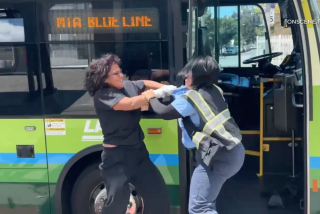OCTA Drivers Union Foe Fighting to Keep His Job
- Share via
Curtis Gamble has been a bus driver for the Orange County Transportation Authority for 14 years, 11 of them on Route 43 along Harbor Boulevard from La Habra to Costa Mesa. It is one of the busiest, most demanding lines in the county.
Driving a bus is all the 36-year-old Anaheim man has wanted to do since he was a teenager in Chicago. OCTA, he says, has honored him with numerous merit awards for safe driving.
Now, the transit agency wants to fire him for violating several rules. The timing, he says, could not be more suspicious.
Gamble is an outspoken critic of OCTA bus operations and leads an effort to oust Teamsters Local 952, which represents the authority’s 1,200 coach operators and is handling his disciplinary case.
Gamble and his supporters among drivers are collecting petition signatures for an election to choose a transit-oriented union to replace the Teamsters, an organization traditionally dominated by truckers. They believe they are poorly represented by the Teamsters, and one result is that they earn less than other bus drivers statewide. They plan to submit the petition to the state Department of Industrial Relations in May.
On Feb. 3, an OCTA inspector boarded Gamble’s bus unannounced and, over the course of the day, counted four violations of OCTA regulations -- more than enough to qualify Gamble for termination. Agency officials upheld the violations, but Gamble has filed a grievance and a decision on his status is pending.
“This is clearly because of my union activity, not because of my driving ability,” said Gamble, who has been working to unseat the Teamsters for more than a year. “Why didn’t they send me to retraining or give me a warning like they have other drivers? It’s completely unfair.”
OCTA officials denied that Gamble was being singled out, and said the citations were fairly issued and aired in a hearing last month.
“We have rigorous standards,” OCTA spokesman George Urch said. “If drivers don’t adhere to those standards, they are disciplined. This has nothing to do with union activity. We care about safety and providing the best customer service we can.”
The disciplinary action and its potential political fallout have placed the Teamsters in an unusual situation. Union officials have the contractual and legal obligation to represent OCTA bus drivers despite their views.
In Gamble’s case, they must fight for a persistent and aggressive activist who wants to replace them. He also has been disciplined by the union before, and has expressed doubt about its ability to represent him.
Last year, Local 952 removed Gamble as a dues-paying member for disloyalty after he campaigned to replace the union while serving as a Teamsters shop steward. He is no longer a union member, but remains part of the Teamster bargaining unit.
“We will do all we can to save him,” said Patrick D. Kelly, secretary-treasurer of Local 952. “We represent everyone. The charges do not warrant termination.”
The Teamsters, Kelly said, do a good job for OCTA drivers and plan to do more on their behalf in the future. He added that he is confident his union will prevail in any election.
Union officials declined to discuss the specifics of Gamble’s disciplinary case because it is pending. If grievance proceedings don’t result in his reinstatement, they said the matter probably will go to arbitration.
Should those hearings fail, Gamble would have the right to sue the Teamsters, OCTA or both, to get his job back. Gamble, meanwhile, insists that the conditions of his firing are suspect, and that OCTA cannot interfere with his attempt to replace the Teamsters.
The official citations charge that Gamble wasn’t wearing his seat belt, failed to call out the names of key stops for passengers and fell behind schedule -- seven minutes at one point, 24 minutes at another.
Gamble says he wasn’t confronted with the accusations until days later and does not clearly recall what happened Feb. 3, which he remembers as a routine day.
He said, however, that his seat belt sometimes catches as it is pulled out, making it difficult to buckle. If it was unfastened, he said, it was for a short distance.
“It is not a perfect world out there,” Gamble said. “And I am not the perfect bus driver.”
But he denied failing to alert riders to stops and transfer points. He noted that the citation mentions only three streets, and that no passengers complained that day about missing their stops.
“I called out the streets,” Gamble said. “I always do this. You have to get people off the bus. I cannot mess this up.”
Falling behind schedule, however, is common on the busier routes, Gamble said, adding that it is a problem for drivers as well as the public.
Gamble and some of his co-workers say OCTA scheduling doesn’t take into account traffic congestion, passengers’ difficulties using the authority’s new fare boxes, extra boarding time for disabled riders and those who must secure their bicycles to bus racks.
OCTA time schedules are so unrealistic, Gamble said, that he and many of his fellow drivers often cannot eat lunch or take a restroom break without falling behind. In fact, in September, the Teamsters’ Kelly sent a letter to OCTA Chief Executive Officer Arthur T. Leahy complaining that “extremely tight schedules and runs” were causing problems.
OCTA officials deny that buses are chronically late. They said the agency constantly works to improve service and keep vehicles on time.
“If a route is too tight, we make adjustments,” Urch said. “The majority of our operators can adhere to the schedules. You are always going to have people who bellyache.”
More to Read
Sign up for Essential California
The most important California stories and recommendations in your inbox every morning.
You may occasionally receive promotional content from the Los Angeles Times.











